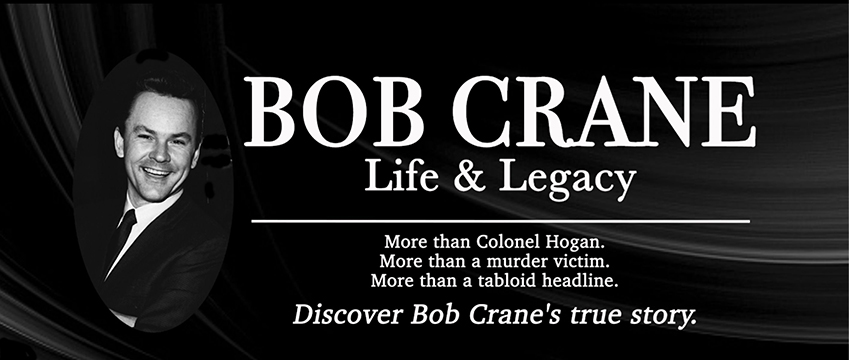 |
Bob Crane appears as a news reporter
in the series Gibbsville.
"Trapped" - December 9, 1976 |
Throughout his career, Bob Crane enjoyed making people laugh. His radio shows were packed to the brim with his humor, and while spontaneous, were something for which he prepared extensively. As he transitioned from radio personality to actor, whether it be on television, film, or stage, Bob preferred comedic roles. However, Bob was also a serious actor, and he worked very hard at learning the profession by studying with Stella Adler and also by accepting roles that would help him expand upon his acting skills.
In the entertainment industry, an actor accepts a role not only for the art but because it is work, and work equals a paycheck. And quite often, unless he or she has made it to the "A List" in the entertainment world, one does not have the luxury of being very selective. Yet, Bob was extremely selective from the outset, turning down numerous offers over the course of his career and often at the expense of a greater salary. Some of the offers he rejected include replacing Jack Paar on The Tonight Show (Johnny Carson accepted the offer), Who Do You Trust? (after Carson vacated the role of host and moved to The Tonight Show), a pilot for a series where he was to play a radio personality (he turned down $300,000 a year), a permanent guest spot on The Ed Sullivan Show, countless Cold War-era film roles (in the same style as The Wicked Dreams of Paula Schultz), and co-host of Good Morning America (he was offered the position in 1974; Good Morning America debuted on November 3, 1975), to name only a few. Bob stuck to his mantra of considering and accepting roles that he believed were good for him, that helped him grow as an actor, or that he thoroughly enjoyed doing.
"I had a choice," said Bob in a 1972 interview with Copley News Service reporter Don Freeman. "When Johnny Carson took over The Tonight Show, I had an offer, $3,000 a week, to replace him on his old show, Who Do You Trust? But I picked The Donna Reed Show instead, for a lot less. I wouldn't have had to learn how to emcee a game show, but I did want to learn to act."
 |
Bob Crane appears as a news reporter
in the series Gibbsville.
"Trapped" - December 9, 1976 |
In the series Gibbsville, starring Gig Young and set in a mining town in rural Pennsylvania during the 1940s, Bob plays a very unlikeable character: a big city news reporter who exploits the grief of the town after a mining accident to get the story. In one scene, Bob's character orchestrates the delivery of unpleasant news to the young wife of a miner who is still trapped below ground. Her reaction is caught on camera, and later, Bob's character catches a sharp punch in the jaw for his indifference toward the town's grief.
It's not what we're used to seeing from Bob Crane, and his performance here is under-rated. We're so used to the likable Colonel Hogan, the quick-witted radioman, or the over-protective and slightly silly father (in Disney's Superdad). But in this episode, Bob takes on a role that is way out of his comfort zone - one where he does not make the audience laugh, but instead, makes them dislike his character immensely. To Bob, who chose his roles very carefully regardless of his financial situation, this was possibly more than just a role he took because it was a job. It was a chance for him to grow as an actor in his profession.
This is not to say Bob turned down every single job offer to come his way. He still needed to work, earn a living, and support himself and his family. Bob appears in dozens of guest-starring episodic work during the mid-to-late 1970s, a period of time where he was breaking free of the Colonel Hogan typecast and reinventing himself. However, Bob typically accepted offers that would allow him to learn, and that Bob was choosy in his roles is well-documented.
Bob's work on Gibbsville is significant and an all-too-brief look at the serious actor he was becoming. Had Bob lived, there is little doubt he would have continued to expand and excel at his talent, ultimately rediscovering his niche at the start of the 1980s, a decade full of exciting new career opportunities for the acting profession.
* * * * * * * * * * * * * * * * * * * * * * * * * * * * * * * * * * * * * * * * * * * * * * * * * * * * * * * *
Reference
Freeman, D. (1972, April 20), Bob Crane ducks TV show. Cape Girardeau Bulletin, p. 5.



